Search the Special Collections and Archives Portal
Search Results
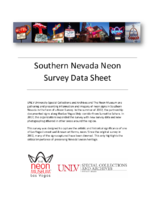
Bunkhouse Saloon Neon Survey document, August 23, 2017
Date
Archival Collection
Description
Site address: 124 S 11th St
Sign owner: 11th Street Tavern LLC and Jillian is the manager (no last name found)
Sign details: This location opened in 1953, but has recently reopened under new ownership. This location is known for their concert venue as well as their southern style bar food.
Sign condition: 3-4- some fading in the plastic so it does not show as clear as an image as it could.
Sign form: Pylon
Sign-specific description: This sign has a black steel base with a sign box on top. This sign box is steel but has wood renderings on the sides of it. The sign box contains a back lit plastic sign that is red with yellow lettering that states "The Bunkhouse Saloon" in a swirly western font. Below this is a reader board.
Sign - type of display: Backlit plastic sign and reader board
Sign - media: Steel, wood and plastic
Sign - non-neon treatments: Plastic backlit sign and readerboard
Sign environment: This location is downtown on East Fremont across the street from PublicUs and a food market.
Sign - thematic influences: Their saloon theme is portrayed in the font on their sign. This theme could also pay homage to the early Las Vegas and Old West theme with the saloon idea.
Survey - research locations: Asessor's Page, Bunkhouse website http://www.bunkhousedowntown.com/about/ and google images.
Survey - research notes: Tried to contact manager for information on sign but no response.
Surveyor: Wyatt Currie-Diamond
Survey - date completed: 2017-08-23
Sign keywords: Pylon; Plastic; Backlit; Steel; Reader board
Text
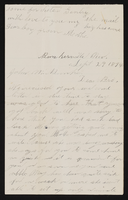
Letter from Francis M. Bunker and John M. Bunker's Mother, Bunkerville, Nevada to John M. Bunker
Date
Archival Collection
Description
From the Syphus-Bunker Papers (MS-00169). The folder contains an original handwritten letter, a typed transcription of the same letter, and a copy of original letter attached.
Text
Steve Sisolak (Nevada Governor) oral history interview conducted by Magdalena Martinez: transcript
Date
Archival Collection
Description
From the Lincy Institute "Perspectives from the COVID-19 Pandemic" Oral History Project (MS-01178) -- Elected official interviews file.
Text
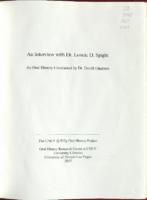
Transcript of interview with Dr. Lonnie D. Spight by Dr. David Emerson, May 8, 2007
Date
Archival Collection
Description
Text
Stocker Family Papers
Identifier
Abstract
The Stocker Family Papers (1860-1982) document the family’s personal, political, and business interests including Mayme Stocker’s 1931 Nevada gaming license and Harold Stocker’s involvement in the Nevada Republican party. The collection contains family correspondence, political documents and planning materials, and business records related to the family’s gaming and real estate interests.
Archival Collection
Southern Nevada Community Concerts Association Records
Identifier
Abstract
The Southern Nevada Community Concerts Association (SNCCA) Records (1939-2004) document the activities of the SNCCA and consist of meeting minutes, financial records, correspondence, promotional papers, newspaper clippings, scrapbooks, photographs, and recordings of select concerts on VHS, Betamax, and an optical disc. The SNCCA worked to bring various singers, orchestras, and ballets to the communities of Las Vegas and Southern Nevada.
Archival Collection

Transcript of interview with Ernie Hensley by Lisa Gioia-Acres, Janurary 25, 2008
Date
Archival Collection
Description
Ernie Hensley, an accomplished African American musician, was born in Washington D.C. on March 14 1940, the son of Ernest W. Hensley Jr. and Gladys Barbara Hensley. Both of his parents worked for the federal government in the nation's capital. Ernest W. Hensley Jr., was an employee at the Department of Defense and Gladys Barbara Hensley mother, who was an excellent pianist and drum major, ultimately set her musical career aside to provide for her family and worked for the National Labor Relations board. At the age of seven, after finding a saxophone in his grandmother's attic, Ernie embarked on his musical journey. He took lessons at the Modem School of Music in Washington D.C. Eventually acquired proficiency with the clarinet and the flute through long hours of practice. Ernie attended a historically black school, Armstrong High School in D.C., until he was transferred to integrated McKinley High School in 1954 following the Brown v. Board of Education ruling. Ernie recalls his experience in a new desegregated environment. After High School in 1957, Ernie joined the Air Force as a member of the 511th Air Force Band. In 1959 he resettled in France to play saxophone for the Air Force Band. Emie ultimately made a career in the Air Force. He had countless experiences of performing around Europe and in Washington D.C. at places like Constitution Hall. A dream came true when Emie was honored to become a member of the "Airmen of Note," the premier jazz ensemble for the United States Air Force. He retired from the Air Force in 1979. Because of his distinguished career in the United States Air Force, Emie had a number of opportunities once he retired from the military. He moved to Las Vegas in 1979 at age 39 and after living in area for just a few weeks, Emie started working with Johnny Haig 3 nights a week. Shortly thereafter, Emie found a long-term home working with Jimmy Mulidore's group at the Hilton for nearly a decade until 1995. Throughout Ernie's lifetime he has been fortunate to work with notable musicians such as Andy Williams, Sammy Davis Jr., Somers, Juliet Prowse, Steve an Eydie and his good friend Sarah Vaughn. Emie, along with his wife Carolyn, a retired UNLV faculty member, still resides in Las Vegas.
Text

Transcript of interview with Dr. Catherine Bellver by Caryll Batt Dziedziak, November 13, 1995
Date
Archival Collection
Description
Dr. Catherine Bellver is a woman with tenacity. How else could one describe her drive to create the Women's Studies Program spanning fifteen years? As a faculty member in the Department of Foreign Languages, Dr. Bellver first joined the Women's Studies steering committee in 1979. In the following decade, the committee oversaw the formation of the Women's Studies Program, including: procuring administrative and faculty support, creating bylaws and course criteria, critiquing proposed cross-listed courses, and selecting course offerings. During that period she also worked with a volunteer group to create and staff the first Women's Center on campus. In the early Nineties, she played an instrumental role in the presentation of four public colloquia that addressed key issues pertaining to women. Dr. Bellver acted as interim director of the Women's Studies Program while overseeing the search for a permanent director. She continued to remain involved with the Women's Studies program, serving as faculty member on several committees. She has also worked in the Women's Caucus on the regional and national levels of the Modem Languages Association Dr. Bellver is currently Distinguished Professor of Spanish in the Department of Foreign Languages at the University of Nevada, Las Vegas. Her work has appeared in journals such as Anales de la Literature Espanola Contemporanea, Hispanic Review, Hispanofila, Insula, Journal of Interdisciplinary Studies, Monographic Review/Revista Monografica, Revista de Estudios Modernos, Revista Hispanica Moderna, Romance Notes and Romanic Review. Dr. Bellver's participation in the creation of the Women's Studies Program illustrates how critical institutional and social progress can result from the commitment of a determined group of individuals. Her decades of involvement in creating an academic arena for the study of women and gender issues underscores the significance of women's contributions to the history of Las Vegas. In addition to the history of the Women's Studies Program at the University of Nevada Las Vegas this interview contains information regarding the creation of the first Women's Center on campus.
Text
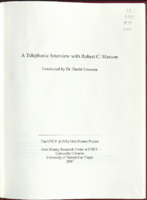
Transcript of interview with Robert C. Maxson by Dr. David Emerson, May 15, 2007
Date
Archival Collection
Description
Text
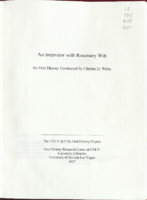
Transcript of interview with Rosemary Witt by Claytee D. White, November 7, 2006
Date
Archival Collection
Description
Text
